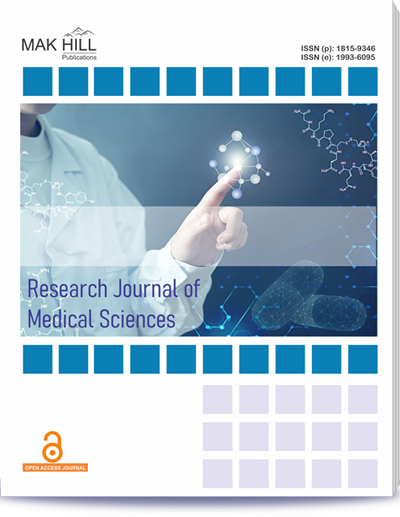
Research Journal of Medical Sciences
ISSN: Online 1993-6095ISSN: Print 1815-9346
Abstract
Endometrial carcinoma is a common malignancy in women, with a rising incidence due to improved awareness and screening programs. The molecular events in its carcinogenesis, particularly involving the tumor suppressor genes PTEN and p53, are not fully understood. Te aim of the study was to analyze the expression of PTEN and p53 in cases of endometrial carcinoma and endometrial hyperplasia and to understand their roles in the disease's pathogenesis. An observational study was conducted with 50 cases (35 endometrial carcinoma and 15 endometrial hyperplasia). Routine processing and H&E staining were followed by immunohistochemical analysis of PTEN and p53. In endometrial hyperplasia, PTEN was positive in 6 of 8 cases without atypia and in 2 of 7 cases with atypia. Among the 35 endometrial carcinoma cases, 28 were Type 1 and 7 were Type 2. PTEN expression was less frequent in carcinoma cases, with most either negative or showing heterogeneous expression. p53 positivity was notably higher in Type 2 carcinomas (71%) and increased with tumor stage and grade, with 8 of 10 Stage II carcinoma cases being p53 positive (Grade 3). PTEN inactivation and p53 over expression are significant in the progression of endometrial carcinoma. PTEN serves as an early marker for carcinogenesis, while p53 mutations are linked to advanced and aggressive tumor stages. These findings highlight the importance of these tumor suppressor genes in the pathogenesis of endometrial adenocarcinoma and underscore their potential as targets for therapy.
How to cite this article:
Amtul Adiba, Aka Sunitha, Rubiya Khatoon and Nandkumar Deshpande. Study of P53 and Pten Immunohistochemical Markers in Hyperplastic and Neoplastic Endometrial Lesions.
DOI: https://doi.org/10.36478/10.36478/makrjms.2024.8.328.332
URL: https://www.makhillpublications.co/view-article/1815-9346/10.36478/makrjms.2024.8.328.332